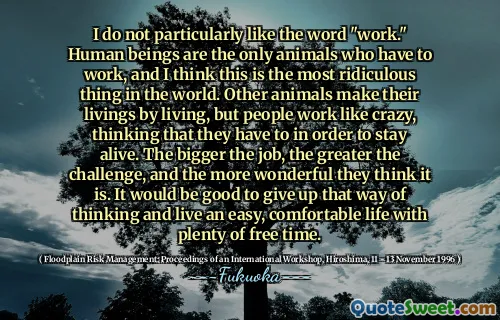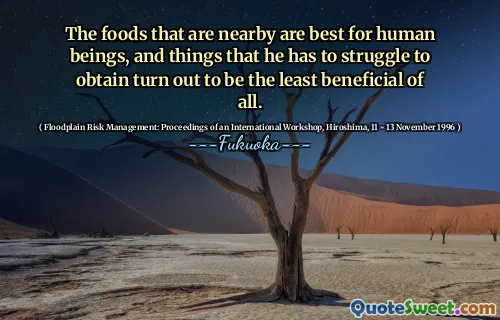Fukuoka, a key figure in Japan's natural farming movement, advocated for sustainable agricultural practices that minimize human intervention. He proposed a farming method that relies on understanding and cooperating with nature's processes, rather than relying heavily on fertilizers or pesticides. His philosophy emphasized a holistic approach to farming that respects the ecosystem and promotes biodiversity.
Fukuoka's notable book, "The One-Straw Revolution," outlines his principles and experiences in farming without tillage or chemicals. He argued that by observing natural systems, farmers can cultivate produce effectively by embracing simplicity and allowing nature to dictate the farming processes. His ideas challenged conventional agricultural wisdom and inspired many to reconsider their agricultural practices.
Through his lifelong work, Fukuoka not only transformed farming techniques but also spread a message of simplicity and sustainability. His legacy continues to influence farmers and environmentalists who seek to create a more harmonious relationship between agriculture and the environment, showcasing the importance of working with nature rather than against it.
More »
Today Birthdays
1729 -
Edmund Burke
1949 -
Haruki Murakami
1954 -
Howard Stern
1876 -
Jack London
1993 -
Zayn Malik
1951 -
Kirstie Alley
1863 -
Swami Vivekananda
1923 -
Alice Miller
1987 -
Naya Rivera
1825 -
Brooke Foss Westcott
1944 -
Joe Frazier
1951 -
Rush Limbaugh
1964 -
Jeff Bezos
1978 -
Jeremy Camp
1628 -
Charles Perrault
1856 -
John Singer Sargent
1970 -
Kaja Foglio
1953 -
Rick Santelli
1986 -
Gemma Arterton
1968 -
Raf Simons
1958 -
Christiane Amanpour
1966 -
Olivier Martinez
1996 -
Ella Henderson
1917 -
Maharishi Mahesh Yogi
1949 -
Ottmar Hitzfeld
1928 -
Ruth Brown
1968 -
Heather Mills
1946 -
George Duke
1968 -
Rachael Harris
1923 -
Ira Hayes

